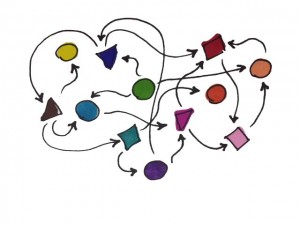Hello!
These past weeks in my Arts Studies class, we have been talking about memory and learning and reading Farhat Shahzad’s “The Role of Interpretative Communities in Remembering and Learning”. This made me think a lot and question how it is that we, and specifically I, learn. Last Friday, our three CAP (Coordinated Arts Program) courses had a joint lecture where we discussed what it means to be a global citizen. The definitions may vary from one course to another but more than differences, there were outstanding similarities as to how the different disciplines view certain concepts, such as that of being a global citizen. When we think about the social sciences we may think about a puzzle that comes together by patching up faces, from presidents to rebels, numbers, in dates and statistics, and ideas. We are expected to learn about this data and we usually do so by adding value or significance to it. We try to take a number or a complex word and connect to a larger concept that we already know. We also learn through factual stories, long or shot, and when no real example exists because the topic discussed is a theory, examples or possible scenarios are a common feature in our learning process.
How each person learns is very different but there are prevalent learning structures that are recognizable in every individual of a specific group. Learning styles are often categorized as visual, kinesthetic, and auditory. I believe that regardless of the style in which someone learns, we can all learn by making connections. The classes in our CAP, Arts Studies, Sociology, and Political Sciences, all connect. We have often discussed with fellow CAP members about the difficulties involved in taking classes that are so interconnected and related, as we often get confused as to what we learned in each course because of the way the material relates. These connections have positive results as they serve to further deepen our knowledge when what we learn in one class is discussed and reinforced in the next. Karl Marx, for example, is a name that has been discussed in both Political Sciences and Sociology. Discussing the authority of Marx as an author of what would become part of history, we are reminded of questions posed and discussed in our Arts Studies class. Who owns memories, who has the authority to tell a story, and what is the difference between personal and collective memory?
Building connections is not something that we started doing until college, instead, it one of the primary ways in which have been learning for most of our lives. In High School, History was one of my favorite subjects. Memorizing was a tedious struggle for me but I tried to remember dates and names by accommodating them into the stories I learned, stories that, when placed alongside each other, added up to what teachers and textbooks referred to as History. Placing myself within the context of the story to try to understand why leaders and revolutionaries acted the way they did was key to my learning. I was born, raised, and educated in El Salvador, a small country in Central America. I love my country and grow increasingly passionate about its history but learning how a nation came to be is never an easy task. Regardless of the hours dedicated to rigorously studying the material from textbooks, the knowledge I acquired was never more than just sets of facts. It was only a connection through narrative that truly allowed me to grasp what my county’s people had lived through. Reading Sandra Benitez’s historical fiction novel, Bitter Grounds, I learned about events that happened during a hundred year in my country’s history. All the events presented in the novel, I had already read about in textbooks and articles, but it was the emotion placed on the characters and their roles in those settings that gave them new and deeper meaning. Literature allows us to be emotionally involved in historical or seemingly abstract situations and this connection is what turns simple memorization into deeper learning.
Have a great day!
Andrea Barraza
